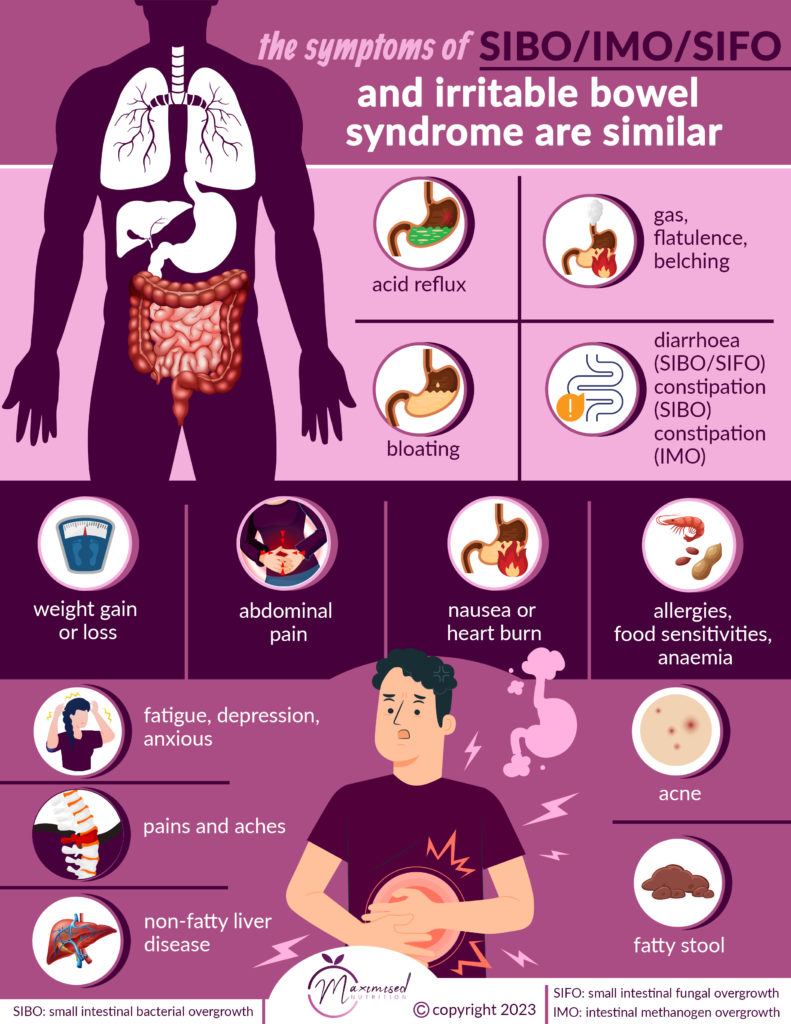Is Chronic Inflammation Silently Harming Your Health? Click to do this 60 second test to find out if it is

SIBO or IMO or SIFO or Intestinal Dysbiosis As A Cause For IBS Symptoms
SIBO and IBS Symptoms: How Dysbiosis, IMO & SIFO May Be the Real Cause

Introduction
Have you tried the low FODMAP diet, yet your IBS symptoms persist?
You’re not alone. Many individuals find temporary or no relief because the root cause may not be food—it may be intestinal dysbiosis. Conditions like SIBO (Small Intestinal Bacterial Overgrowth), IMO (Intestinal Methanogen Overgrowth), and SIFO (Small Intestinal Fungal Overgrowth) are increasingly recognised as underlying drivers of gut health and IBS.
A meta-analysis across 37 studies revealed that SIBO is present in 36.7% of patients with Irritable Bowel Syndrome (IBS) (Pimentel et al., 2020). If your IBS symptoms include bloating, gas, constipation, or diarrhoea—even after dietary changes—it may be time to investigate SIBO, IMO, or SIFO.
What Is Intestinal Dysbiosis?
The human gut contains over 1,000 species of microorganisms, including bacteria, viruses, yeasts, and archaea. These organisms play critical roles in digestion, immune health, and communication with other organs like the brain. When the balance of this ecosystem is disrupted, the condition is known as intestinal dysbiosis (DeGruttola et al., 2016).
Dysbiosis involves:
• An overgrowth or depletion of microbial species
• Loss of diversity
• Shifts in microbial location
• Altered metabolic function
This imbalance contributes to IBS symptoms such as gas, bloating, and unpredictable bowel habits.
SIBO: Small Intestinal Bacterial Overgrowth
SIBO is the overgrowth of bacteria in the small intestine, especially species normally found in the colon. These bacteria ferment undigested food, producing gas and toxins that irritate the gut lining and interfere with nutrient absorption (Pimentel et al., 2020).
Symptoms of SIBO and IBS
• Bloating
• Excessive gas
• Abdominal pain
• Diarrhoea or constipation
• Nutrient deficiencies (iron, B12, fat-soluble vitamins)
What Causes SIBO?
• Low motility: slow gut transit allows bacteria to accumulate
• Structural issues: like diverticulosis or past surgeries (e.g. Roux-en-Y)
• Medical conditions: diabetes, IBD, lupus, coeliac disease
• Medications: proton pump inhibitors, antibiotics, narcotics
• Food poisoning: One in nine people develops IBS post-gastroenteritis (Pimentel et al., 2020)
SIBO is a leading factor in persistent IBS symptoms, especially when dietary changes alone are ineffective.
IMO: Intestinal Methanogen Overgrowth
IMO is now recognised as distinct from SIBO. Instead of bacteria, the culprits here are archaea, particularly Methanobrevibacter smithii, which produce methane gas (Triantafyllou et al., 2014).
Symptoms of IMO
• Chronic constipation
• Slow gut motility
• Bloating
• Feeling full quickly
IMO is especially relevant for those with IBS-constipation subtypes. Methane gas slows down intestinal movement, compounding digestive distress (Triantafyllou et al., 2014).
SIFO: Small Intestinal Fungal Overgrowth
SIFO involves excessive fungal organisms—most often Candida—growing in the small intestine. Unlike candidiasis, which affects immunocompromised individuals, SIFO occurs in healthy people too.
Studies have shown that 26% and 25.3% of individuals with unexplained gastrointestinal symptoms had fungal overgrowth (Erdogan & Rao, 2015).
Symptoms of SIFO
• Belching
• Indigestion
• Nausea
• Diarrhoea or gas
• Bloating
These symptoms closely resemble SIBO and IBS symptoms, which can lead to misdiagnosis if fungal involvement is not considered.
Why FODMAP Doesn’t Work for Everyone
Many people try the FODMAP diet to relieve IBS symptoms, but if intestinal dysbiosis is the root cause, dietary changes alone won’t resolve the imbalance. You may feel worse if you're restricting foods while harbouring overgrown organisms that feed off even trace nutrients.
How to Test for SIBO, IMO, and Gut Dysbiosis
1. Small Intestinal Aspirate & Culture
An invasive test via endoscopy where a sample from the upper small intestine is analysed. However, it only samples 5–6 cm of a ~600 cm long organ and risks contamination (Pimentel et al., 2020).
2. Hydrogen–Methane Breath Testing
This non-invasive test uses glucose or lactulose to stimulate fermentation. If SIBO, IMO, or large intestine dysbiosis is present, gases like hydrogen and methane are released, absorbed into the bloodstream, and exhaled. A breath test measures these gases, offering an effective diagnostic tool.
Lactulose breath tests show high correlation with advanced microbial sequencing techniques (Pimentel et al., 2020).
Where to Get Tested
Maximised Nutrition offers convenient at-home breath testing kits with easy-to-follow instructions. Learn more in our article on How to Prepare for a Hydrogen–Methane Breath Test.
Red Flags That Require Medical Referral
Before assuming you have SIBO, SIFO, or IMO, speak with your GP if you experience:
• New symptoms after age 50
• Unexplained weight loss
• Blood in stool
• Night-time diarrhoea
• Iron-deficiency anaemia
• Abnormal lab results or physical exam findings
These may indicate serious conditions like IBD or cancer.
Maximised Nutrition: Supporting You Through Testing and Recovery
Maximised Nutrition supports clients with persistent SIBO and IBS symptoms through:
• Home breath testing for SIBO and IMO
• Nutrition therapy for gut dysbiosis
• Functional assessment of leaky gut and immune triggers
• Personalised plans to restore gut microbiome balance
Take the next step toward understanding your symptoms and reclaiming your gut health.
Conclusion
If your IBS symptoms haven’t improved with diet changes, you may be dealing with gut dysbiosis, SIBO, IMO, or SIFO. These conditions often go unrecognized, yet they play a central role in chronic digestive symptoms. With proper testing and support from specialists like Maximised Nutrition, relief is possible.
References
Erdogen A, Rao S. Small Intestinal Fungal Overgrowth Current Gastroenterol Rep (2015)17:16
Konstantinos Triantafyllou, Christopher Chang and Mark Pimentel: Methanogens, Methane and Gastrointestinal Motility. J Neurogastroenterol Motil 2014; 20(1): 31-40 https://doi.org/10.5056/jnm.2014.20.1.E
Pimental et al: ACG Clinical Guideline: Small Intestinal Bacterial Overgrowth. The American Journal of Gastroenterology 2020: 115(2):p 165-178
DeGruttola A et al: Current understanding of dysbiosis in disease in human and animal model . Inflamm Bowel Dis. 2016 May; 22(5): 1137–1150 (https://www.ncbi.nlm.nih.gov/pmc/articles/PMC4838534)